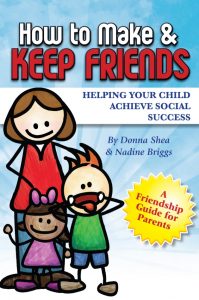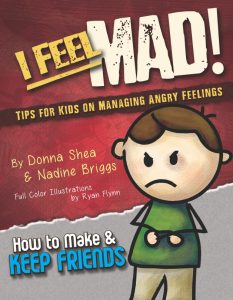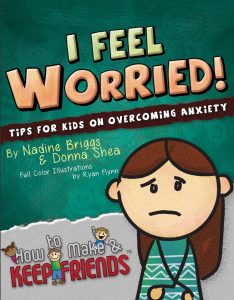
How to Make & Keep Friends: Tips for Kids to Overcome 50 Common Social Challenges:
How to Make & Keep Friends: Tips for Kids to Overcome 50 Common Social Challenges offers social skills and friendship advice presented in a reference guide format, using lists to easily find tips and strategies on a specific topic or social situation. This is a resource for those children who benefit most from direct instruction or learn more effectively using factual materials rather than fictional stories.
While the reading grade level and content is geared toward elementary school kids, many teens and adults report they are finding these tips on the basics to be helpful. Included are simple and immediately actionable tips to navigate common social situations that can be challenging, such as:
- How to Join a Group
- How to Safely Handle Angry Feelings
- Handling Rejection and Exclusion
- Working Things Out & Sharing Fairly
- Being a Good Guest and Host
- Playground Success
- … and much more!

How to Make & Keep Friends: Helping Your Child Achieve Social Success:
How to Make and Keep Friends: Helping Your Child Achieve Social Success is a how-to manual for parents of children with social challenges. The easy-to-read format clearly outlines common barriers that hinder friendships, provides actionable tips for overcoming those barriers, and includes suggested language for parents to use to provide support to their kids during unstructured social interactions.
Parents play a key role in the formation of friendships. How to Make and Keep Friends: Helping Your Child Achieve Social Success shows parents how to guide their children toward true and meaningful friendship connections.
Donna and Nadine, both social coaches with extensive experience, have used these coaching tips successfully for many years. In this companion to their book for children, How To Make and Keep Friends: Tips For Kids To Overcome 50 Common Social Challenges, they share their easy-to-implement techniques for coaching kids toward attaining, sustaining, and generalizing improved social skills, including real-life stories of how these same tips have been effective with children attending their social skills programs.

How to Make & Keep Friends: Tips for Teens on Life and Social Success
Being a teenager isn’t always easy and navigating friendships and relationships can be especially difficult for some teens. Our goal in writing this third book in our friendship series was to help make the social journey through the teenage years an easier one. This time in life can feel both exciting and difficult. There are some challenges that every teen experiences. These include:
- Changing Brains
- Changing Bodies
- Strong Emotions
- Understanding Yourself
- Developing a Value System
- Awkwardness
- Changing Friendships
- Barriers to Social Success
We know from our experience as social coaches that everyone is “friend-able.” Sometimes a teen needs a little support or advice to make that happen. We had real teens help us with writing the tips in this book. This book builds on the tips that we talked about in our Amazon best-selling book for younger kids, How to Make & Keep Friends: Tips for Kids to Overcome 50 Common Social Challenges. For tweens or younger teens, the end of our first book and the beginning of this one will be the right developmental combination of tips.
The book is meant to be used as a reference guide. We did not intend for it to be read cover to cover. Teens can easily flip to the section they want to know more about and read only the parts that will be interesting and helpful them as an individual or for a specific situation. There is a total of 500 immediately actionable tips for teens to use.

I Feel Mad! Tips for Kids on Managing Angry Feelings:
The I Feel Mad workbook provides simple, actionable and proven strategies to help kids manage angry feelings. In this workbook, your child will learn:
- the anger rule to follow and what they cannot do when they are feeling angry;
- that anger is a normal emotion we all have, but managing anger appropriately is a critical life skill;
- how to identify the physical sensations of anger and implement strategies before it becomes too hot to handle;
- a menu of safe strategies to choose from when angry situations arise;
- and effective problem-solving skills and specific reactions to replace an angry response.
I Feel Mad is written at a 3rd grade reading level. Younger children can easily access the content with parent support and some older children (up through 5th grade) have found the workbook to be a helpful tool for coping with strong feelings.

I Feel Worried! Tips for Kids on Overcoming Anxiety
The I Feel Worried workbook provides simple, actionable and proven tips to help kids manage anxious feelings. In this workbook, your child will learn:
- that anxiety is a normal and sometimes necessary emotion we all experience;
- how to understand and label feelings;
- how to identify the physical sensations of anxiety and implement strategies before the fear becomes too strong;
- calming exercises to choose when anxiety-provoking situations arise;
- effective coping skills and specific strategies to manage anxiety;
- that he or she has the power to overcome anxious thoughts and become an expert worry ninja.
Shea and Briggs consult with families, school systems, and community organizations to improve the social and emotional lives of children everywhere.

I Need to Win! Tips for Kids on Good Sportsmanship
Good sportsmanship is key to making and keeping friends, but for children who struggle with competitiveness, poor sportsmanship can negatively affect friendships. Without the tools to know how to manage competitiveness and win and lose with grace, children may find it difficult to make and keep friends or participate in team activities.
Social-emotional learning experts, Nadine Briggs, Director of Simply Social Kids, and Donna Shea, Founder of the Peter Pan Center for Social and Emotional Growth have co-authored I Need to Win! Tips for Kids on Good Sportsmanship to teach young readers how to balance competitiveness with good sportsmanship.
The book, published in a workbook format, is a self-help guide to learning that being competitive is not a bad thing when children keep in mind tips and strategies to keep the gameplay from getting too competitive. The workbook presents a variety of takeaway tips, ideas, and activities in ordinary, everyday language and simple phrases that children, parents, teens, teachers, counselors and other adults that work with children can quickly learn and implement to manage competitiveness.

Bully Busting & Managing Meanies:
Bully Busting & Managing Meanies is the 4th in the series of workbooks authored by social-emotional learning experts, Donna Shea and Nadine Briggs. The co-authors of the How to Make and Keep Friends book series have more than 30 years of combined experience in social coaching children. Donna and Nadine’s books teach children to use their simple, actionable, and proven strategies for increased social success.
Bullying is a serious and complex problem and touches the lives of nearly all children, some as victims of bullying, some as the bullies, and some as the bystanders who do not know how to help. Bullying is difficult to prevent, and children need support in learning how to protect themselves when mean or bullying situations arise. The workbook offers ways for children to become more bully-proof
Using our easy-to-read and interactive guide, kids will learn:
- The distinct differences between bullying and conflict;
- How reactions and responses to conflict and meanness matter;
- Steps on how to build self-confidence and defend themselves;
- How and when to ask for help from an adult;
- What to do if they see other kids being mean to someone; and,
- Our tips on how to get along and make recess more fun.
The full-color, beautifully illustrated workbook also includes questions, quizzes, and scenarios for discussion and practice.

